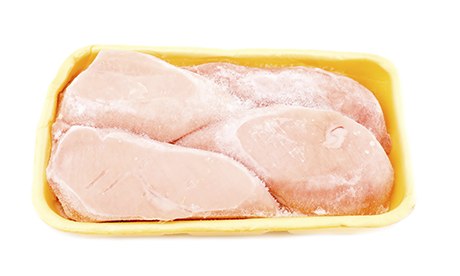 Chicken tumbling to add water – a widespread industrial practice
Chicken tumbling to add water – a widespread industrial practice
Tumbling chicken fillets in large cement-mixer-like machines to take in water is legal – as long as it is correctly labeled
 Felicity Lawrence The Guardian,
Felicity Lawrence The Guardian,
Chicken fillets are 'tumbled' in cement mixer-like machines to bulk them up with water. Photograph: Alamy
The industrial practice of tumbling chicken fillets in large cement-mixer-like machines so that they take up water is widespread. In some cases chicken meat undergoes a further process in which more water is injected into it.
A Guardian investigation 10 years ago exposed Dutch manufacturers using the technology to adulterate chicken meat with heavily disguised beef waste.
Companies in Germany and Spain were extracting proteins by hydrolysis from beef and pig hides and even from cattle bones and selling them in powder form to be mixed with water – the added proteins lock water into the flesh so that it does not flood out when the chicken is cooked.
The companies making the protein powders had found ways of extracting the protein so the DNA was hard to detect. The FSA had to work with laboratories to develop new methods of testing to establish which species were being used. It was this work that led to tests able to detect horse DNA in beef.
Efforts to police and stop the adulteration of chicken – which spanned a global chain from Britain, to Holland, Germany and Spain – broke down between the different jurisdictions. The UK authorities called for an EU limit on how much water could be added to chicken, but no action was agreed in Brussels. It remains legal to add water and additives to bind it in, even protein of other species, so long are they are declared on the label.
There is no evidence that supermarket frozen chicken makes use of added animal proteins, but the technology of adding water and other additives has spread to the high street.
Industry sources say the recession has given new impetus to adulteration of chicken. The price of grain to feed livestock has been at record highs, partly as a result of increased global demand and partly because extreme weather associated with climate change has affected crops. As a result, inflation in meat has been running at rates significantly higher than headline inflation. While the cost of the raw material and the fuel needed to keep the global meat supply chains operating has risen, wages have been stagnating and consumers have less money to spend.
Supermarkets have responded by promoting discount ranges, though paying for water may not be such a bargain.
SOURCE: guardianUK
A Guardian investigation 10 years ago exposed Dutch manufacturers using the technology to adulterate chicken meat with heavily disguised beef waste.
Companies in Germany and Spain were extracting proteins by hydrolysis from beef and pig hides and even from cattle bones and selling them in powder form to be mixed with water – the added proteins lock water into the flesh so that it does not flood out when the chicken is cooked.
The companies making the protein powders had found ways of extracting the protein so the DNA was hard to detect. The FSA had to work with laboratories to develop new methods of testing to establish which species were being used. It was this work that led to tests able to detect horse DNA in beef.
Efforts to police and stop the adulteration of chicken – which spanned a global chain from Britain, to Holland, Germany and Spain – broke down between the different jurisdictions. The UK authorities called for an EU limit on how much water could be added to chicken, but no action was agreed in Brussels. It remains legal to add water and additives to bind it in, even protein of other species, so long are they are declared on the label.
There is no evidence that supermarket frozen chicken makes use of added animal proteins, but the technology of adding water and other additives has spread to the high street.
Industry sources say the recession has given new impetus to adulteration of chicken. The price of grain to feed livestock has been at record highs, partly as a result of increased global demand and partly because extreme weather associated with climate change has affected crops. As a result, inflation in meat has been running at rates significantly higher than headline inflation. While the cost of the raw material and the fuel needed to keep the global meat supply chains operating has risen, wages have been stagnating and consumers have less money to spend.
Supermarkets have responded by promoting discount ranges, though paying for water may not be such a bargain.
SOURCE: guardianUK
No comments:
Post a Comment